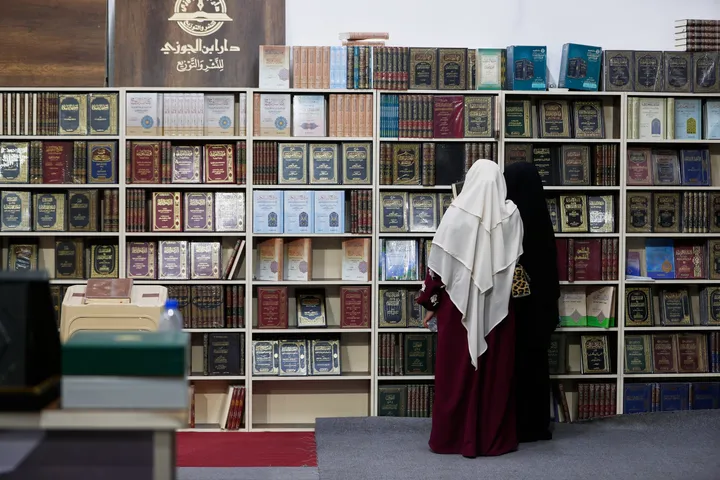Pro-Israel lobby groups have derailed the academic career of a Palestinian woman days before she was due to start teaching her first class at a university in the UK.
Shahd Abusalama was preparing to meet her students for an orientation session on the subject of Postcolonial Media Culture on January 21 when the Sheffield Hallam University emailed her a notice of suspension.
The Campaign Against Anti-Semitism, the UK Zionist Federation and publications like the Jewish Chronicle have run a smear campaign against the 30-year-old former Gaza camp refugee who has worked for Palestinian rights for almost a decade.
“I am just shocked and disgusted that my university will bow to pressure from the Zionists and it will not stand for its own member against malicious attacks, which are clearly meant to silence the opposition of Israel and its crimes,” she tells TRT World in a phone interview.
Shahd is a PhD researcher at Sheffield Hallam and was excited to launch her career as a lecturer. The university has not told her the exact nature of the allegations against her.
A TRT World email to the university’s press office remained unanswered at the time of publishing.
The censure Shahd faces is part of a growing trend in which academics in the UK, Europe, Canada and the US are labelled as antisemitic for criticising Israel’s treatment of Palestinians.
Last year, David Miller, a professor at Bristol University, was fired after being accused of anti-Jewish bigotry, an allegation he was cleared of by two separate university investigations.
Various pro-Israel groups encourage Jewish students on campuses to disrupt Palestinian solidarity events and report professors who are known for calling out Israel for its continuing occupation of Palestinian territories.
Such silencing is stifling the culture of open debate and discussions, academics say.
“Israel is desperate to silence us because of the political effectiveness of the campaigns that I have been part of,” says Shahd.
Academics like Shahd started to face heat especially after the International Holocaust Remembrance Alliance (IHRA) pushed universities to adopt a new definition of antisemitism.
“Proponents of the IHRA definition are part of what some are calling a new antisemitism movement that seeks to label criticism of Israel as antisemitic,” a trio of professors from Canada’s Wilfrid Laurier University wrote last year.
Dozens of UK professors voiced concern about the definition in a 2017 letter. The UK government has warned universities to adopt the IHRA definition or face funding cuts.
The main IHRA definition says: “Antisemitism is a certain perception of Jews, which may be expressed as hatred toward Jews. Rhetorical and physical manifestations of antisemitism are directed toward Jewish or non-Jewish individuals and/or their property, toward Jewish community institutions and religious facilities.”
But it goes on to add: “Manifestations might include the targeting of the State of Israel, conceived as a Jewish collectivity.”
Critics say this definition can easily be used to shut political discourse on Israeli government policies, which includes denying Palestinains the right to return to their homes in occupied territories.
‘Blow to one is a blow to all’
“The IHRA definition is framed in relation to quashing any criticism of Israel,” says Malia Bouattia, the former president of the National Union of Students (NUS) of the UK.
“What we are seeing is that anti-Zionism and antisemitism are being presented as one. They are absolutely not,” she tells TRT World.
Students and academics in the UK who are affiliated with causes such as the Boycott, Divestment and Sanctions (BDS) movement have been victims of witch hunts that have intensified in recent years, says Bouattia.
“People are starting to wake up to the fact that the pro-Israel lobby is not going to cease and the opposition needs to be much more organised. And we need to understand that a blow to one is a blow to all.”
Support for Shahd is pouring in from all over the world. The hashtag In Support of Shahd has been doing the rounds on Twitter and she has received thousands of messages in the last few days.
“It’s overwhelming and beautiful to see the messages that people from a very diverse background have sent me,” she says.
“But I am stateless. My situation is precarious and the Zionists see me as an easy target.”
The girl who danced
Shahd doesn’t like being called an activist. She says she does what a Palestinian is supposed to do - and that’s resisting Israel in every legal way possible.
She began recording Israeli aggression against Palestinians in her early 20s. In a blog post in November 2012 when Israeli jets bombarded Gaza, she wrote about the aftermath of airstrikes.
As a student in the UK, she helped start Hawiyya Dabke, a dance collective, which performs Palestinian folk dances as a show of resistence to Israeli occupation.
She’s also part of a group that succeeded in forcing Israeli arms manufacturer Elbit Systems to recently shut its factory in Oldham, a town in northern UK.
“Everything that she is doing is for the cause of liberation of Palestinian people and other oppressed people,” says Bouattia, who has known Shahd from her NUS presidency days.
“Many who have experienced what she has might have given up so much sooner. But there’s so much resistance within her. It reminds us what excuse we have?”
But Shahd’s work has put her in the line of fire.
In 2019, Shahd made a parody of singer Madonna’s song Papa Don’t Preach, turning it into Madonna Don’t Go, ahead of the Eurovision contest, which took place in the occupied Palestinian village of al-Manshiya. She immediately became a target of pro-Israel publications.
Tweaking the context
Shahd says pro-Israel lobbies have been after her for years and she has suspicions about how they have finally pinned her down.
Sheffield Hallam University might have come under pressure to investigare after she was linked to a poster, which said: “Stop the Palestinian Holocaust.”
Students and academics can land in trouble for using the term Holocaust in any context that’s not agreeable with Jewish students because Sheffield Hallam has adopted the IHRA’s definition of antisemitism.
As per the IHRA, one example of antisemitism includes: “Drawing comparisons of contemporary Israeli policy to that of the Nazis.”
The university student who made the poster was facing an investigation after Jewish students filed a complaint. When someone asked Shahd for her views on the controversy, she wrote a tactful Twitter thread, advising against using a word, which has become politicised.
“I was basically engaging in an academic debate on the word - linguistically and historically - and citing other scholars both Palestinians and Jews who have made such comparisons between the Shoah and Nakba,” she says.
Palestinians use the word Nakba, which means catastrophe, for the 1948 expulsion of Arabs by Israeli forces. Shoah is a Hebrew word for catastrophe and is used to refer to the Holocaust, when millions of Jews were killed by Nazis.
“There’s nothing antisemitic about my tweet,” says Shahd.
The Campaign Against Antisemitism, which lobbies for universities to adopt the IHRA’s definition on antisemitism, has used the tweets to launch an onslaught.
But Shahd - her name in archaic Arabic means honeycomb - is undeterred. She is holding her ground and ready to sting Israel’s supporters where it hurts.
“They are losing the battle on the narrative level and they are desperately trying to stereotype us as antisemites,” she says.
“I believe strongly that mobolisation of Palestinian people is becoming effective and freedom of Palestine is just a matter of time.”























